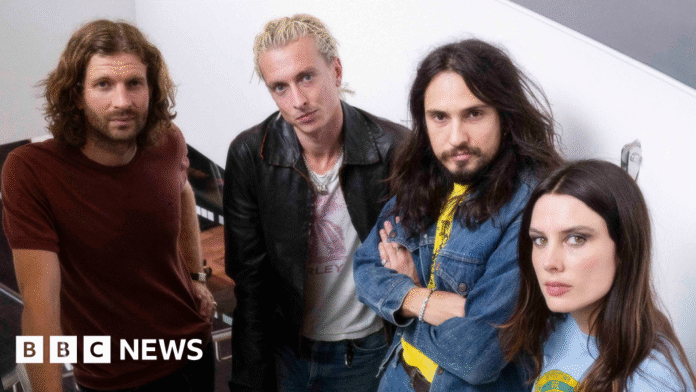Mark SavageMusic Correspondent
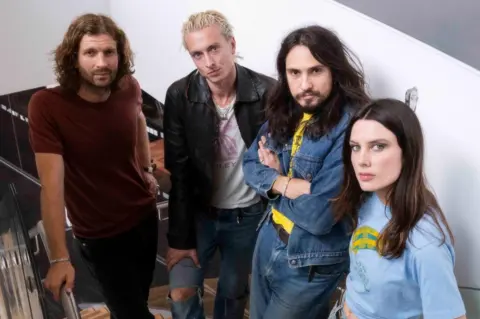 BBC
BBCWolf Alice are in a class of their own when it comes to the Mercury Prize.
Last month, they received their fourth consecutive nomination for the coveted music award thanks to their new album, The Clearing.
That’s something no-one else has ever achieved. Not Arctic Monkeys, not Radiohead, not Pulp. What’s more, they’ve done it with their first four albums.
“For some reason, it makes me feel really anxious,” admits singer Ellie Rowsell, speaking to the BBC from Nashville, where the band are in final rehearsals for their world tour.
She’s speaking from experience. When Wolf Alice won the Mercury Prize for their second album, Visions of a Life, in 2018, Ellie struggled to gain her composure at the podium.
“I’m so nervous,” she exclaimed, her hands shaking, before bandmate Theo Ellis stepped in to finish the speech.
To fans, Rowsell’s jitters might have seemed strange. On stage, the singer is normally a fireball of intensity, screaming punky anthems like Yuk Foo and commanding the spotlight with magnetic charisma.
But their more intimate songs portray her as an habitual outsider who doubts her own abilities and motivations.
On Thorns, the pensive opening song of The Clearing, she even berates herself for “making a song and dance” about the break-up that inspired Wolf Alice’s previous album, Blue Weekend.
“I don’t know if I’m shy. I think I’m socially inept,” she recently told Canadian DJ Tara Sloane. “I’m very confident in some things, but I’m not the loudest person in the room.”
Her nerves about attending another awards show is understandable, then. But Rowsell is also “grateful and happy” to be included on the Mercury shortlist again. They will find out if they have won when the ceremony takes place on Thursday.
“We take albums pretty seriously,” says guitarist Joff Oddie, speaking from his home in London (he’s sitting out the US tour because his wife’s about to give birth to their first child).
“In our world, a good album is one of the highest forms of art. People can do good songs, or a great live performance, and those are all great signposts. But, for me, a really great album is an incredible feat… if you can pull it off.”
That’s why the band have signed up as ambassadors for National Album Day, which takes place on Saturday, 18 October, with special events around the UK and limited edition vinyl re-releases of classic records by Liam Gallagher, Patti Smith and Iggy Pop.
Asked to name their favourite albums, however, and Wolf Alice are evasive.
“I don’t know what my absolute top three would be,” says Rowsell. “But if I can re-listen to an album top to bottom over and over again, that’s a telltale sign – because it’s hard to keep your attention.”
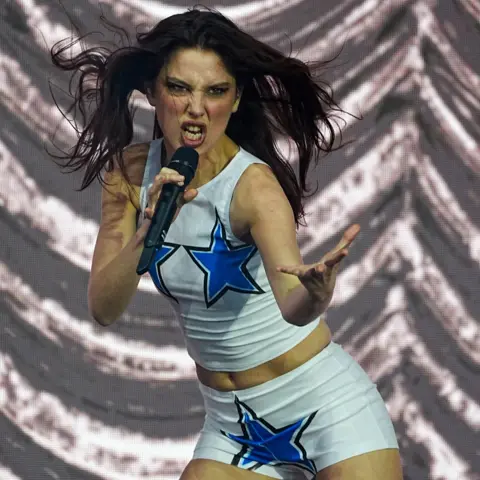 PA Media
PA MediaThe singer – who reveals Pink’s Missundaztood was the first album she owned – eventually settles on The Streets’ A Grand Don’t Come For Free as an example of “a perfect album”.
“I feel like it’s one of those albums where, even if it’s not to your taste, you can actually appreciate the artistry,” she says.
“I’m not really that into concept albums, but it’s got an amazing story from beginning to end – and it never compromises the songs,” agrees Oddie.
The guitarist also chooses Brian Eno’s ambient classic Music For Airports as one of his Desert Island Albums.
“I’ve spent most of my adult life in transit, and it’s a beautiful record for zoning out the outside world,” he says.
Shape shifters
They collectively agree that 1966’s The Velvet Underground & Nico is a must-have for any serious music fan.
“It’s one of the most important alternative records of all time,” says Oddie. “It’s got incredible songwriting, the songs stand up on their own, but they’re cloaked in really avant-garde sounds and techniques.
“As a guitarist in an indie band, if you can write incredible songs and play them interestingly, then you’re part of that lineage.”
The variety of their tastes – Rowsell also selects the mutant folk of Lankum’s 2023 album False Lankum – is the key to Wolf Alice’s shape-shifting sound.
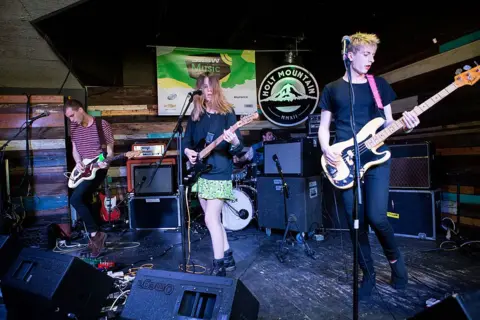 Getty Images
Getty ImagesThey started out as a folk duo in 2010 but quickly expanded to a quartet, adopting an alt-rock style characterised by Oddie’s textured guitar work, the rhythmic interplay between bassist Ellis and drummer Joel Amey, and Rowsell’s cutting lyricism.
In the early stages, Oddie says, they were “just muddling through”.
“We had no idea, from a technical perspective, of what we were doing.
“We worked with some brilliant people that were, in hindsight, very, very patient with us.
“It was probably a nightmare to make a record [with us] at that time because we had an idea of what we wanted to sound like, but we didn’t know how things worked.”
Each album marked a progression. Their 2015 debut My Love Is Cool wrapped ethereal indie anthems in barbed-wire guitar riffs; 2017’s Visions Of A Life produced their biggest hit, the delirious synth-driven Don’t Delete The Kisses, as well as winning the Mercury; and 2021’s Blue Weekend added a sweeping, bruised grandeur to their sound.
The Clearing, which topped the UK album chart in August, marks their boldest evolution yet – embracing the nostalgic sounds of 1970s FM pop radio, earning comparisons to The Carpenters, Fleetwood Mac and Steely Dan.
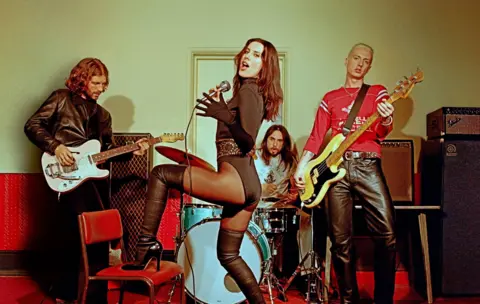 Rachel Fleminger Hudson / RCA Records
Rachel Fleminger Hudson / RCA Records“Maybe in hindsight it was a bit of a stylistic turn,” says Rowsell. “But it didn’t feel too drastic at the time. It just reflected what we were listening to.”
Their goal was to make a record that felt good to play live, full of what Oddie calls “more song-y songs” like the Blue Weekend track Delicious Things – which has become an unexpected highlight of their live shows.
“That song was a departure from what we’d done before [and] it didn’t feel like it was one people would enjoy live,” says Rowsell.
“But the audience were just as upbeat and excited as when we play one of our rock songs.
“So I was like, ‘OK, it’s not just fast, loud, heavy music that gets a crowd going’. And that was really exciting.”
“It’s a confidence thing,” adds Oddie. “Sometimes you feel like you have to make yourself heard by being as loud and abrasive as you can be.
“We were going, ‘Oh, we can connect with the audience in a way that’s just as impactful, but different’.”
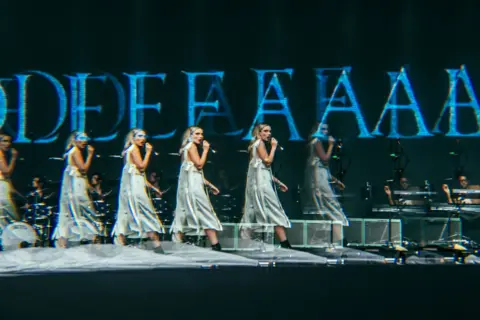
Recorded in Los Angeles with A-list producer Greg Kurstin (Adele, Beyoncé, Foo Fighters), the album is unapologetically big; brimming with harmonies and hooks and ambition and heart.
But the soft rock reinvention caught some critics off guard. While reviews were largely positive, The Quietus recoiled at the lack of heavy guitar anthems in a scathing screed that employed descriptors like “unintrusive”, “clunking” and “by-numbers detritus”.
“Wolf Alice had the juice. On The Clearing, that juice has abandoned them,” agreed Soundsphere’s Callie Petch.
Admittedly, it takes a minute to adjust – but The Clearing is one of those records that reveals new depths and complexity with every listen.
The songs might not have the tinnitus-inducing qualities of old favourites like Fluffy or Play The Greatest Hits, but there’s a newfound confidence and playfulness amid the calm.
That’s why, on the album’s artwork, Wolf Alice lean into the iconography of 70s rock.
Ellis poses in a leather jacket studded with the words Wolf Alice. Rowsell stands in a spotlight, head thrust back as she sings with eyes-screwed-shut intensity.
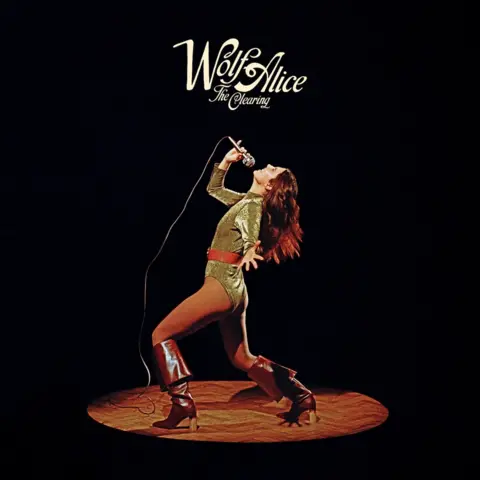 RCA Records
RCA Records“On our first two albums, the artwork was just found images,” says Rowsell. “And if you can stumble across a photo that represents the music and the lyrics, it’s really romantic and amazing.”
For this record, however, Wolf Alice called in photographer Rachel Fleminger Hudson – who spent six months trawling through “thousands and thousands” of archive images and interviews to create an aesthetic that reflected the band’s inspirations and ambitions.
“She was very academic in how she approached it,” says Oddie. “There was a lot of leather. A lot.”
It all adds up to a declaration of intent.
A criticism/compliment that’s often been levelled at Wolf Alice is that they’re impossible to pin down. Their influences are too broad. Their ideas are too disparate.
But The Clearing has a clarity and purpose that suggests they’re finally OK with the idea of being a chart-topping, festival-headlining “big band”.
“Oh, I don’t know if we’re owning being a big band,” Oddie demurs.
“I don’t think we’d say that. But we are owning being a band, full stop.
“We’re leaning into the lore.”
Source link




